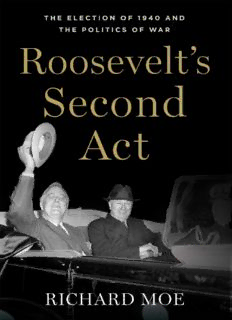
Roosevelt's second act : the election of 1940 and the politics of war PDF
Preview Roosevelt's second act : the election of 1940 and the politics of war
ROOSEVELT’S SECOND ACT PIVOTAL MOMENTS IN AMERICAN HISTORY Series Editors David Hackett Fischer James M. McPherson David Greenberg James T. Patterson Brown v. Board of Education: A Civil Rights Milestone and Its Troubled Legacy Maury Klein Rainbow’s End: The Crash of 1929 James McPherson Crossroads of Freedom: The Battle of Antietam Glenn C. Altschuler All Shook Up: How Rock ‘n’ Roll Changed America David Hackett Fischer Washington’s Crossing John Ferling Adams vs. Jefferson: The Tumultuous Election of 1800 Joel H. Silbey Storm over Texas: The Annexation Controversy and the Road to Civil War Raymond Arsenault Freedom Riders: 1961 and the Struggle for Racial Justice Colin G. Calloway The Scratch of a Pen: 1763 and the Transformation of North America Richard Labunski James Madison and the Struggle for the Bill of Rights Sally McMillen Seneca Falls and the Origins of the Women’s Rights Movement Howard Jones The Bay of Pigs Elliott West The Last Indian War: The Nez Perce Story Lynn Hudson Parsons The Birth of Modern Politics: Andrew Jackson, John Quincy Adams, and the Election of 1828 Glenn C. Altschuler and Stuart M. Blumin The GI Bill: A New Deal for Veterans Richard Archer As If an Enemy’s Country: The British Occupation of Boston and the Origins of Revolution Thomas Kessner The Flight of the Century: Charles Lindbergh and the Rise of American Aviation Craig L. Symonds The Battle of Midway Also by Richard Moe The Last Full Measure: The Life and Death of the First Minnesota Volunteers Changing Places: Rebuilding Community in the Age of Sprawl (coauthor) RICHARD MOE ROOSEVELT’S SECOND ACT The Election of 1940 and the Politics of War Oxford University Press is a department of the University of Oxford. It furthers the University’s objective of excellence in research, scholarship, and education by publishing worldwide. Oxford New York Auckland Cape Town Dar es Salaam Hong Kong Karachi Kuala Lumpur Madrid Melbourne Mexico City Nairobi New Delhi Shanghai Taipei Toronto With offices in Argentina Austria Brazil Chile Czech Republic France Greece Guatemala Hungary Italy Japan Poland Portugal Singapore South Korea Switzerland Thailand Turkey Ukraine Vietnam Oxford is a registered trademark of Oxford University Press in the UK and certain other countries. Published in the United States of America by Oxford University Press 198 Madison Avenue, New York, NY 10016 © Richard Moe 2013 All rights reserved. No part of this publication may be reproduced, stored in a retrieval system, or transmitted, in any form or by any means, without the prior permission in writing of Oxford University Press, or as expressly permitted by law, by license, or under terms agreed with the appropriate reproduction rights organization. Inquiries concerning reproduction outside the scope of the above should be sent to the Rights Department, Oxford University Press, at the address above. You must not circulate this work in any other form and you must impose this same condition on any acquirer. Library of Congress Cataloging-in-Publication Data Moe, Richard. Roosevelt’s second act : the election of 1940 and the politics of war / Richard Moe. pages cm Includes bibliographical references and index. ISBN 978-0-19-998191-5 ISBN 978-0-19-998191-5 1. Presidents—United States—Election—1940. 2. Roosevelt, Franklin D. (Franklin Delano), 1882–1945. 3. United States—Politics and government—1933–1945. 4. United States—Foreign relations—1933–1945. 5. Presidents—Term of office—United States. 6. World War, 1939–1945—United States. I. Title. E811.M58 2013 973.917092—dc23 2013004529 1 3 5 7 9 8 6 4 2 Printed in the United States of America on acid-free paper To Julia That quality of simplicity which we delight to think marks the great and noble was not his. He was the most complicated human being I ever knew; and out of this complicated nature there sprang much of the drive which brought achievement, much of the sympathy which made him like, and liked by, such oddly different types of people, much of the detachment which enabled him to forget his problems in play or rest, and much of the apparent contradiction which so exasperated those associates of his who expected “crystal clear” and unwavering decisions. But this very complication of his nature made it possible for him to have insight and imagination into the most varied human experiences, and this he applied to the physical, social, geographical, economic and strategic circumstances thrust upon him as responsibilities of his time.
Description: